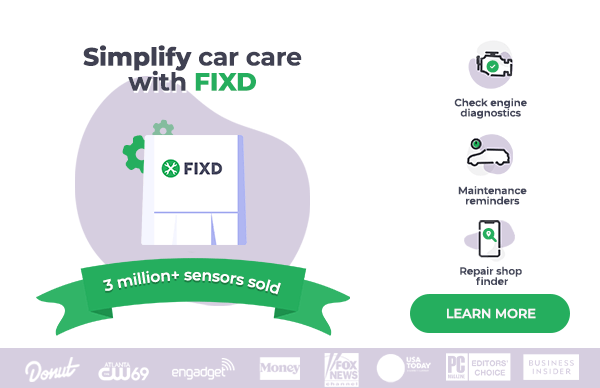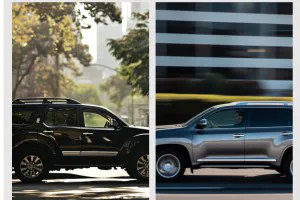Few cars are as popular as the Honda Civic, which first hit the streets half a century ago. During this time, the Japanese automaker has sold more than 27 million Civics across the globe. And while the Civic enjoys an overall positive reputation for reliability, not every model year is perfect.
With this in mind, we combed through numerous sources to identify the best and worst years for the Honda Civic. (Check out our Honda Accord best & worst years too). It’s a handy thing to know if you’re shopping for a second-hand Civic or already have a Civic sitting in the driveway. The data comes from the thousands of FIXD car scanners installed in Honda Civic models, hundreds of owner surveys, and published information covering fuel economy, recalls, safety testing, and other vital factors.
Here’s a summary of the findings, followed by a more detailed explanation.
| Best Years | Why? | Worst Years | Why? |
| 2006 |
Good reliability scores, even for an older model. |
2001-2005 |
Poor reliability scores, high potential for expensive repairs |
| 2010 |
Strong reliability ratings, lower chances for expensive repairs |
2007-2009 |
Iffy dependability reports, mediocre fuel economy. |
| 2013-2015 |
Excellent dependability scores, reduced likelihood of costly problems |
2011 |
Low-reliability ratings from owners, high probability for pricey repairs |
| 2016-2021 |
Solid reliability ratings, great MPG performance and crash test scores |
2012 |
First year of 9th generation, strong likelihood of expensive engine repairs |
If you’d like to see an in depth comparison of this vehicles competitors, check out:
Honda Civic Engine Reliability Score, Safety Ratings & MPG Year-by-Year
Before diving into specific Honda Civic model years for a thumbs up or down, let’s explore an overview of major areas of dependability. We’ll look at engine reliability, crash test reports, and fuel economy.
Engine Reliability Score – Over The Years

Our analysis covered Honda Civic engine reliability from two perspectives; data from the FIXD app and owner survey results. In general, you’ll see an overall trend that Civic engine reliability increases with newer model years. However, there are some noticeable exceptions based on owner reports. Each model years’ reliability was rated on a scale of 1-10 for both app data and survey responses.
In particular, according to owners, the 2009 and 2011-2012 Civics are ones to avoid. We get into these specifics later on, but seeing these warnings is something a prospective Civic shopper should keep in mind.
The FIXD Reliability score is based on Check Engine Lights and every time one goes on, a Diagnostic Trouble Code (DTC) is generated. These help the mechanic determine whats wrong with the engine. If you’re curious, we put together a cheatsheet with the Top 5 DTCs (& what they mean) for Honda Models.
When shopping for a used Honda Civic, it’s essential to remember that not all vehicles are cared for equally. To protect yourself from lemons, take along a FIXD Sensor on your test drive. FIXD connects to a free app on your smartphone to tell you more about the vehicle you’re checking out, including check engine lights and other hidden issues that the owner or dealership may be attempting to hide. Click here to learn more and get FIXD for only $19.99 (regular price $59)!
NHTSA Safety Score – Over The Years
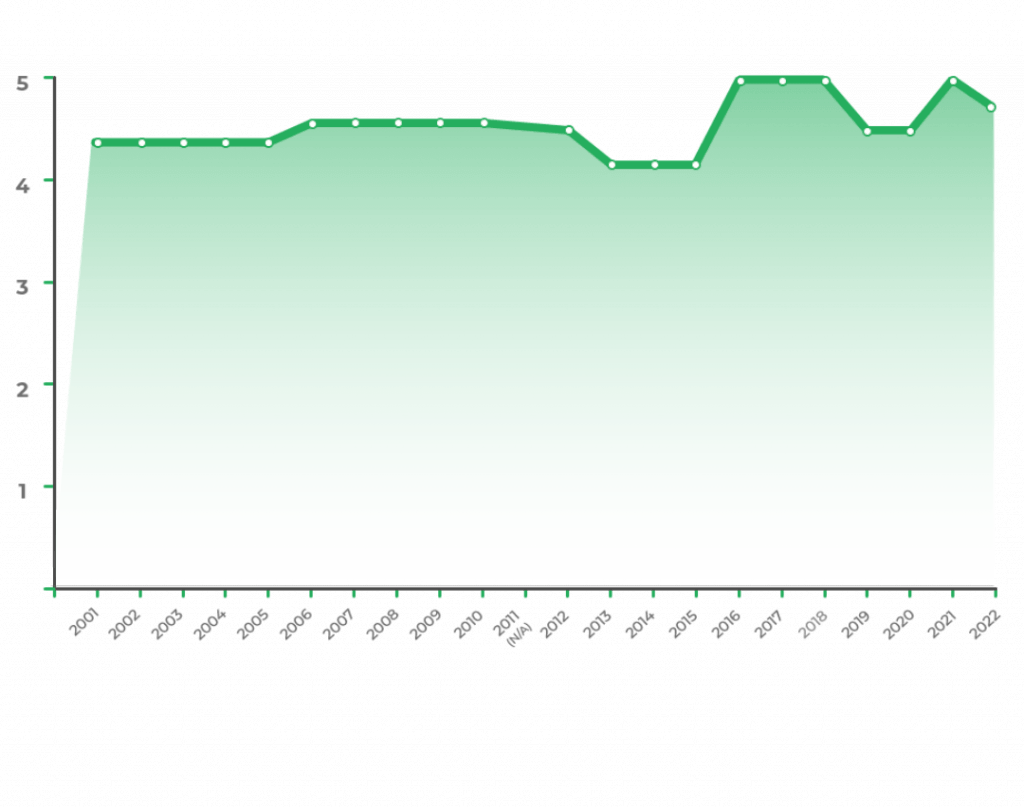
The Honda Civic is an often-shopped vehicle for new drivers and those looking for efficient transportation, which translates into the need for an affordable, smaller car with good safety scores. High safety ratings also help keep insurance premiums low.
A review of crash test performance gives Honda Civics from the last two decades an average safety score that doesn’t fall below 4.25 (out of 5). That’s according to tests conducted by the National Highway Transportation Safety Administration (NHTSA).
Exploring the Civics with the lowest results focuses on the 2013-2015 model years (which are worthwhile vehicles to consider). Competitive cars, such as the Kia Forte, Toyota Corolla, and Volkswagen Jetta (from the 2013 model year), have overall NHTSA ratings of 4 (out of 5).
In other words, these Civics have safety scores that are as good as, if not better than, comparable cars.
MPG – Over The Years
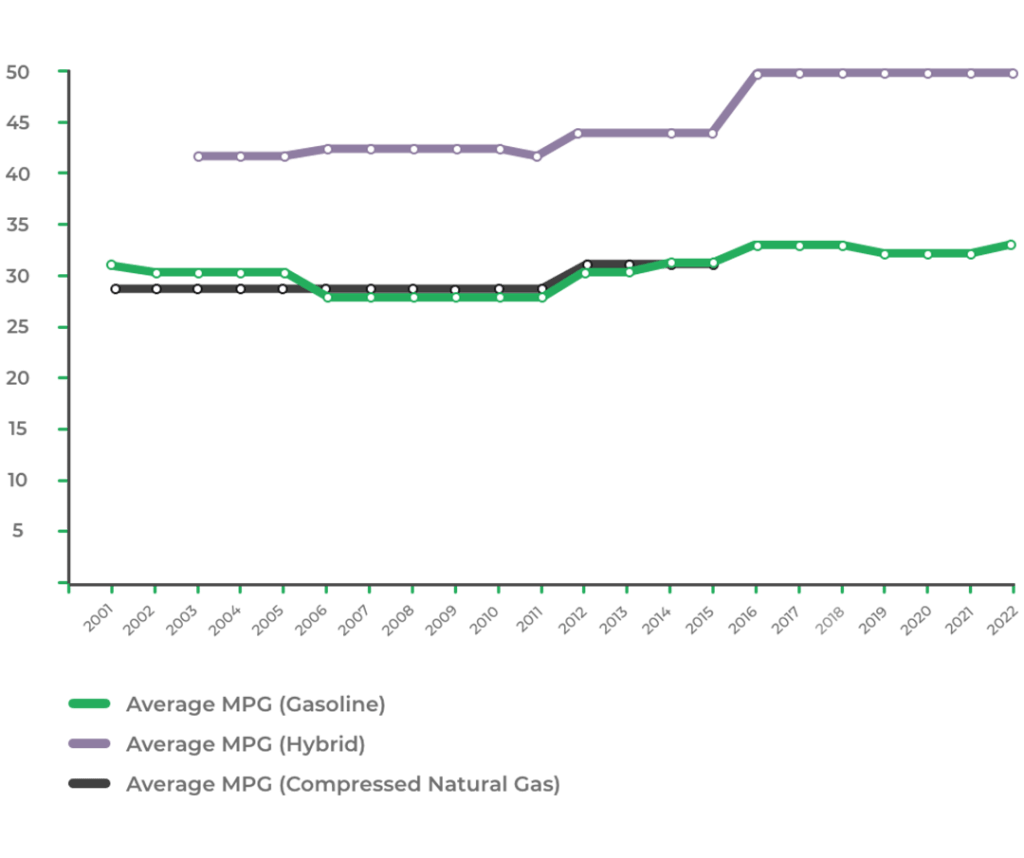
Keeping gas station visits to a minimum also helps with car ownership expenses. Overall, the Honda Civic fulfills this mission with respectable fuel efficiency over recent decades. Yes, you’ll find some older Civics (from the 2000s) that aren’t standouts in this area, but no car is perfect. And fuel economy that hovers in the 30 mpg range is still notable.
Regardless, a look at fuel economy data from the U.S. Department of Energy shows the Honda Civic consistently delivers better-than-average results among new cars. The typical 2021 light-duty car offered 25.7 mpg, compared to 32 mpg for a 2021 Civic.
Recalls & Warranties
Recalls of interest:
Factory Warranties (Years we could find info online):
2004 Honda Civic Warranty – What’s Covered & What’s Not
2005 Honda Civic Warranty – All Coverage & Exceptions
2006 Honda Civic Warranty – All Coverage & Exceptions
2007 Honda Civic Warranty – All Coverage & Extensions
2008 Honda Civic Warranty – What’s Covered & What’s Not
2009 Honda Civic Warranty – Coverage & Exclusions
2010 Honda Civic Warranty – Find Out What It Covers
2012 Honda Civic Warranty — Do You Know What’s Covered?
2013 Honda Civic Warranty – What You Need to Know
2014 Honda Civic Warranty – What’s Covered & What’s Not
2015 Honda Civic Warranty: What’s Covered & What’s Not
2016 Honda Civic Warranty: Benefits & Exclusions
2017 Honda Civic Warranty: What’s Covered & What’s Not
2019 Honda Civic Warranty: What’s Covered and What’s Not
2020 Honda Civic Warranty: Coverage & Exclusions
Current Market Value of All Honda Civic Years & Cost Per Year to Repair and Maintain Each

Engine reliability also affects repair and maintenance costs as well as market value. And while some Honda Civic model years have more expensive upkeep expenses (detailed later on), it’s clear that there are no wild swings in these costs. Yet, it’s interesting to see how higher repair expenses for the 2012 Civic coincide with a dip in the market value for this car (hint: stay away from this Honda).
If you’d like to learn about this vehicle’s past depreciation rate & our projected depreciation rate based on that, check out: Honda Civic | Depreciation Rate & Curve Graphed
Important Features Timeline

1996: Debut of the 6th-generation Civic with dual airbags, ABS standard on some trims
1997: All Civic trims get 14-inch wheels, LX sedan comes with air conditioning
1998: Civic VP (Value Package) trim is introduced
1999: Sporty Civic Si variant makes its debut
2000: Last year of the 6th-generation, three trim-based engine options
2001: Launch of the 7th-generation Civic; no hatchback body style
2002: Civic Si returns as exclusive 2-door hatchback
2003: Civic Hybrid joins the lineup
2004: Civics receive refreshed exterior styling
2005: New SE trim appears with rear wing and upgraded stereo
2006: 8th-generation Civic debuts including Hybrid and Si variants
2007: Civic sedan gets the Si trim
2008: Limited-run Mugen Si is introduced, EX trim available with leather seating
2009: Civic exterior receives updates, new LX-S and DX Value Package trims join the lineup
2010: A carryover year with no major changes
2011: The manual transmission is dropped from the EX-L trim
2012: 9th-generation Civic is introduced, Civic Si crosses the 200 hp threshold
2013: Refreshed exterior corrects poorly received design from 2012
2014: CVT replaces the automatic transmission, engines get more power
2015: Sedan-only SE trim joins the Civic lineup
2016: 10th-generation Civic launches with turbo 1.5-L engine
2017: Civic Type R finally lands in the US, gets 306 hp
2018: A carryover continuing with hatchback, sedan, and coupe body styles
2019: Honda Sensing is standard on every Civic, Civic Sport trim appears
2020: Civic Si and hatchback receive an exterior refresh
2021: Civic coupe and Si trim get axed
2022: 11th-generation Civic debuts with Accord-like looks and sedan and hatchback body styles
The Best Years of the Honda Civic
Based on a ranking based on engine reliability data, safety scores, owner feedback, and fuel economy, some Honda Civic model years stand above the rest. Let’s take a year-by-year look at the best Honda Civics. We’ll also include likely diagnostic trouble code (DTC) indicators and a brief review of recall information provided by the National Highway Traffic Safety Administration (NHTSA).
2006 Honda Civic
FIXD App Engine Reliability: 7/10
Owner-Reported Reliability: 7/10
KBB Value: $3,339
Fuel Economy: 27 mpg
Annual Maintenance/Repair: $588
Safety Rating: 4.6
Buying a car that’s more than a decade old can be a recipe for trouble, which is why most of the earliest Civics from the 21st century are on the “worst list” (see below).
However, there are exceptions, and the 2006 Honda Civic is one of them. It gets a respectable reliability score (7 out of 10) from owners.
The ‘06 Civic also received an average 4.6 rating (out of 5) from NHTSA for crash test safety.
With an average fuel economy of 27 mpg, this Civic isn’t as efficient as some other years, but that’s an OK trade-off for increased reliability.
Of course, no car is perfect. The 2006 Civic is prone to certain problems, predominantly a bad engine coolant thermostat (DTC P0128), but this is a cheap fix (usually in the $50 to $150 range). Yet, be alert for a bad catalytic converter (DTC P0428)—a common condition for vehicles this old; these repairs are pricey, about $1,538-$2,041. You may also come across DTC P0303, an indicator that the spark plugs need replacement, costing $58 to $167.
Further, the 2006 Civic has a 65% chance of needing repairs over $500 over the course of one year, according to our owner survey—this is still better than older models. If work is necessary, it’s likely to involve the climate control system.
And while no one wants to spend an annual average of $588 to fix and maintain a car, that’s the price to pay for owning a vehicle that’s approaching two decades of age.
According to NHTSA, this Civic is subject to as many as 15 recalls, but not all versions have all 15 recalls. Many of these recalls are related to the infamous Takata airbag issue.
2010 Honda Civic
FIXD App Engine Reliability: 7/10
Owner-Reported Reliability: 8/10
KBB Value: $5,010
Fuel Economy: 27 mpg
Annual Maintenance/Repair: $650
Safety Rating: 4.6
The 2010 Civic is another best-year example from the eighth-generation edition. Scores are similar to the 2006, but there are a few areas where this Civic is even better.
Notably, there’s only a 38% chance of expensive repairs (above $500), according to our owner survey. And the most likely service needed is brake work, which is really a maintenance matter more than a repair. Some of these expenses are likely reflected in the $650 per year that the typical owner of a 2010 Civic spends each year to keep things in working order.
There still may be a need for a catalytic converter replacement (DTC P0420) or an issue with the cooling system thermostat (DTC P0128), but keep in mind this is a 12-year-old car, and these repairs are to be expected.
All of the eight recalls for this model are related to airbags.
In a nutshell, the 2010 Honda Civic is the sweet spot for car shoppers wanting a wallet-friendly vehicle that’s less likely to break down.
2013-2015 Honda Civic
FIXD App Engine Reliability: 7-8/10
Owner-Reported Reliability: 7-9/10
KBB Value: $7,033-$8,095
Fuel Economy: 30-31 mpg
Annual Maintenance/Repair: $339-$681
Safety Rating: 4.25
After skipping the ninth-generation Civic’s inaugural year (2012, see below), this Honda enjoys solid scores for reliability, fuel economy, and modest repair costs.
FIXD app engine reliability data gives the 2013 and 2015 model years an 8 out of 10, while owners rank the 2015 Civic a near-perfect 9 for being trusty transportation.
NHTSA crash testing gives these cars a slightly below-average overall safety score of 4.25 (out of 5), which is still a worthy result.
Owners of these cars face a reduced likelihood (35%-42%) of repairs exceeding $500, and most of these issues are upkeep-related (brakes and tires). Only the 2013 Civic has a greater chance of engine-related troubles (a spillover from the first-year blues of the 2012 model).
When it comes to maintenance and repair expenses, one Civic from this grouping is particularly noteworthy. The 2014 Civic costs the average owner only $339 per year for upkeep, the second lowest amount of any Civic since 1996 (the 2021 Civic is the cheapest to maintain).
For the most part, DTC codes involve minor to modest repairs, such as replacing the engine coolant thermostat (P0128) at $181 to $373. Less expensive work (under $150) will likely require replacing the air intake boot (P0171), a wide hose connecting the air filter to the throttle plate. Owners may also need to fix the evaporative (EVAP) emissions canister purge valve (P0497), part of the pollution control system.
Recalls for these Hondas are few, with the 2013 model having zero (with two for the 2014 model and one for 2015).
2016-2021 Honda Civic
FIXD App Engine Reliability: 7-8/10
Owner-Reported Reliability: 8-10/10
KBB Value: $10,768-$20,968
Fuel Economy: 32-33 mpg
Annual Maintenance/Repair: $250-$600
Safety Rating: 4.5-5
It’s no surprise that the tenth generation makes the list of best Honda Civic years; newer vehicles have fewer worn-out parts and less mileage. While skipping the first year of an all-new model is good advice, the 2016 Civic so far appears not to suffer from the typical gremlins.
Most 2016-2021 Civics score an 8 out of 10 for reliability (from the FIXD app engine reliability data and owner reports), with only the 2017 and 2018 Civics dipping to 7.
Fuel economy comes in at 32 mpg, and NHTSA’s overall safety rating is at 4.5 or 5 (out of 5).
There is a 45%-56% likelihood of an expensive repair ($500 or higher) for most of these years, but the work centers on tires and brakes, components that eventually wear down on every vehicle. That’s one reason why the 2019 Civic has $600 in average annual maintenance costs. On the other hand, it only costs $250 per year to keep a 2021 Civic in working order, as nothing substantial has yet to wear out.
The only red flag in the FIXD app engine data is DTC P0127 for the 2018 Civic, indicating a problem with the fuel system or pump. This can be expensive to correct out of warranty, with repairs running from $909 to $1,351. Otherwise, there are few reports associated with diagnostic trouble codes.
But despite the thumbs up for these Civic model years, there are few recalls to deal with. For instance, the 2017 Civic was recalled for four issues, ranging from an incorrect owner’s manual to problems with the steering and drivetrain. There are no recalls for the 2021 edition, but there are a handful of issues for Civics in this grouping.
The Worst Years of the Honda Civic
As with most things in life, bad accompanies good. And such is the case with the Honda Civic. Using the same details to highlight the best Civic model years, we also explore the worst ones. These are vehicles to stay away from if you’re car shopping, or at least be aware of if you’re already a Honda Civic owner.
2001-2005 Honda Civic
FIXD App Engine Reliability: 5-4/10
Owner-Reported Reliability: 4-5/10
KBB Value: $2,186-$2,618
Fuel Economy: 30-31 mpg
Annual Maintenance/Repair: $525-$694
Safety Rating: 4.4
It’s sad to say but keeping away from the entire seventh-generation Honda Civic (2001-2005) is wise. And not that they’re terrible cars regarding function and capability, but age exacts a toll. Reliability scores for these Civics are eye-opening (or eye-watering if you already own one).
If dependability ratings of 4 or 5 (out of 10) don’t frighten prospective buyers, then the probability of needing costly service will. For instance, there’s an 82% chance that the 2004 Civic will require repairs costing more than $500, and the job will entail engine work. Similarly, the 2002 Civic has a 71% possibility of undergoing engine repairs. Further, the most likely trouble areas involve the expensive-to-fix engine and transmission. The other years (2001, 2003, and 2005), still have a 50% potential for pricey service needs.
A look at average annual upkeep costs ($525-$694) can also mean substantial outlays to keep these Civics going.
A look at the most frequent DTCs for the 2001-2005 Civic doesn’t help either. P0341 comes up as the most common DTC for the 2005 Civic, indicating a problem with the camshaft position sensor. This usually gets corrected by shelling out $1,046 to $1,615 for a new timing chain.
It’s also typical to deal with DTC P0420, a bad catalytic converter. Less severe issues include P0134, a faulty air/fuel ratio sensor, and P0300, a malfunctioning ignition coil. These are repairs that cost under $200 to correct.
A staggering number of recalls (up to 27 for the 2001 Civic and 15 for the 2005 model) is another reason to pass on these Hondas.
2007-2009 Honda Civic
FIXD App Engine Reliability: 7/10
Owner-Reported Reliability: 4-6/10
KBB Value: $3,422-$4,058
Fuel Economy: 27 mpg
Annual Maintenance/Repair: $417-$688
Safety Rating: 4.6
While FIXD app engine data reports a moderate reliability score of 7 (out of 10) for these Civics, owner-supplied information is more troublesome. The 2007 and 2008 models receive a ranking of 6, a letter-grade equivalent of a D. And the 2009 comes in at 4, among the lowest reliability ratings for any 21st-century Civic.
There’s also a 58% chance the 2009 model will require a $500 or greater repair, which is likely to be a difficult-to-diagnose electrical issue. These Civics also have among the worst average fuel economy ratings (27 mpg) for any Civic since 2001.
A review of DTC data reveals the 2007-2009 Civics haven’t escaped similar problems facing other Civics. Mainly, this involves P0420 (catalytic converter) and P0128 (engine coolant thermostat). Issues with the mass air flow sensor (P0171) are common, with repairs costing $172 to $309.
Like with the previous grouping of “bad” Civics (2001-2005), expenses to keep a 2007-2009 Civic running can be high. In particular, this amount reaches $688 per year for the 2008 model year.
Recalls dropped significantly for most eighth-generation Civic models, with most relating to airbags. However, as we’ve covered, there are numerous other reasons to keep the 2007-2009 Civics on the worst list.
2011 Honda Civic
FIXD App Engine Reliability: 8/10
Owner-Reported Reliability: 5/10
KBB Value: $5,459
Fuel Economy: 27 mpg
Annual Maintenance/Repair: $417
Safety Rating: N/A
The issues with the 2011 Civic are a continuation of problems with the 2007-2009 models (the 2010 makes the “best” list and is covered earlier). Owner-reported reliability is poor (ranking 5 out of 10), fuel economy (27 mpg) is mediocre, and there’s a 56% likelihood that owners will spend more than $500 to get something fixed. At least annual maintenance costs aren’t too bad at $417.
Airbag recalls are still an issue, too. In short, there are better Honda Civics to buy. Beyond the usual DTC indicators for this generation, P0133 (a troublesome oxygen sensor) is a known issue.
2012 Honda Civic
FIXD App Engine Reliability: 8/10
Owner-Reported Reliability: 6/10
KBB Value: $4,695
Fuel Economy: 30 mpg
Annual Maintenance/Repair: $833
Safety Rating: 4.5
The ninth-generation Honda Civic launches for the 2012 model year with a big thud, thanks to troublesome reliability reports from owners (a 6 out of 10 rating). Most significantly, a 63% chance of incurring a repair costing over $500 is another reason to move onto another Civic model year. Here’s further proof: when this expensive work happens, it will most likely involve the engine.
Yearly average maintenance repair costs of $833 make the 2012 model among the most expensive Civics to upkeep from the last two decades.
Further, many 2012 Civics are subject to recalls (three total) for a bad driveshaft, an incorrect steering column, and fuel line problems.
2022 Honda Civic
Honda introduced the all-new eleventh-generation Civic for the 2022 model year. There’s too little data available to report on reliability for this model, but avoiding the first-year teething pains associated with a new-design vehicle can help eliminate headaches and frustration.
Frequently Asked Questions: The Best and Worst Years of the Honda Civic
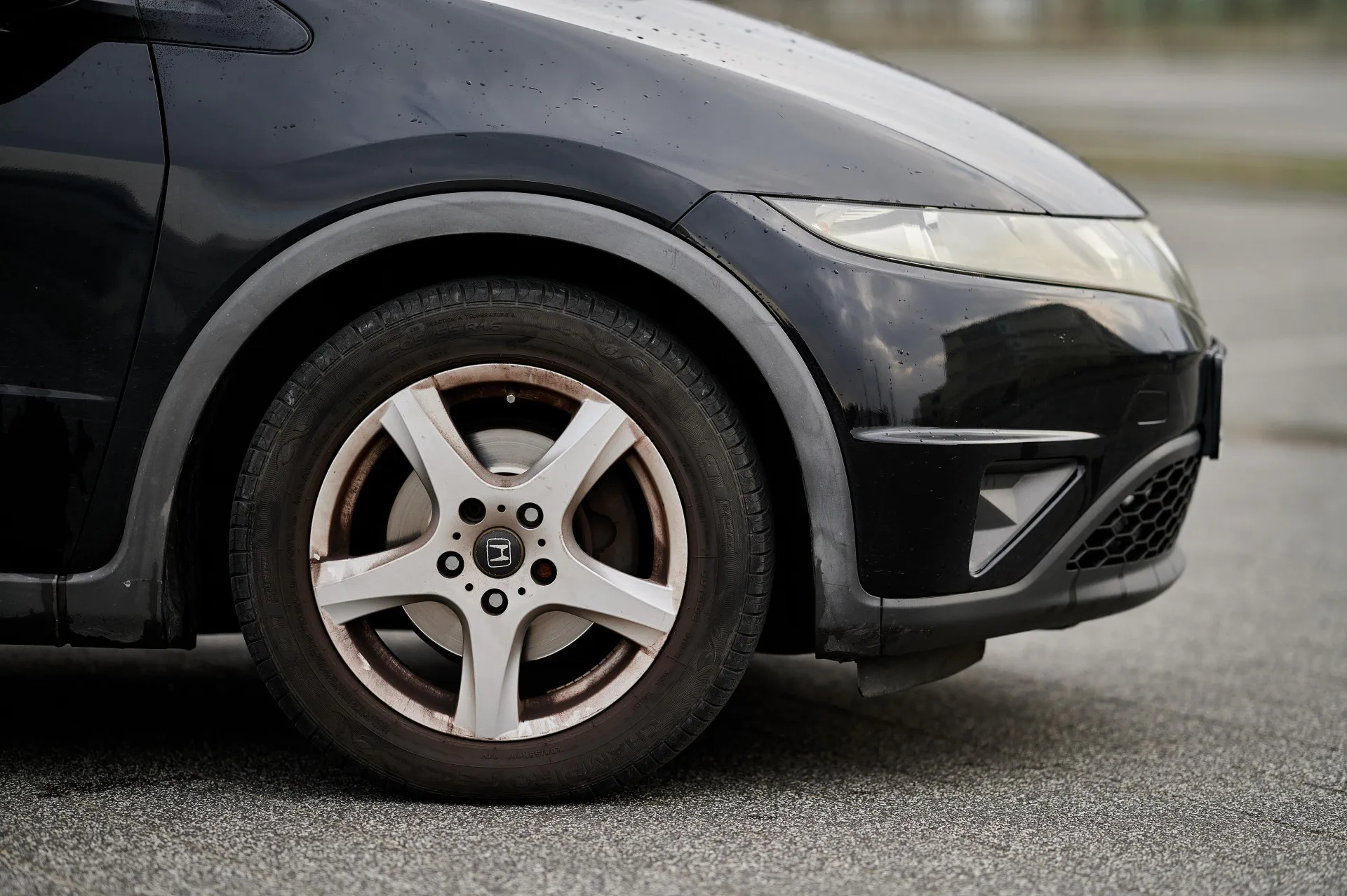
What years of the Honda Civic have engine and/or transmission problems?
Except for the 2001 model, modern Honda Civics enjoy a good reputation for transmission reliability. But the same blanket statement can’t be said about Civic engines. Notably, the 2002, 2004, and 2012 model years have a high probability for engine troubles, with the 2004 being particularly worrisome (an 82% chance of an expensive engine repair). In addition, the 2003, 2005, 2008, and 2013 can also be called out for potential engine troubles (a likelihood that’s less than 50%, but still something to be concerned about).
What is considered high mileage for a Honda Civic?
It’s difficult to determine an absolute number that tags a Civic as a high-mileage vehicle because it comes down to condition and other factors. Sure, 200,000 miles may seem excessive, but if it involves mostly highway travel in a well-maintained car, then mileage may be less critical. On the other hand, a poorly-maintained Civic with 100,000 miles that’s endured nothing but start-and-stop driving may indeed be past its prime. A “high-mileage” determination is best handled case-by-case, following a thorough mechanical inspection.
What other vehicles should I consider?
Besides the Civic, there are numerous other options for car shoppers wanting to stay in the Honda family. The Accord offers four-door convenience, a spacious cabin, and more powerful engines. Meanwhile, the now-discontinued Fit provides hatchback convenience in a smaller package.
Of course, Honda is well-known for its crossover SUVs, including the CR-V, one of the most popular vehicles in the U.S., and the subcompact HR-V. Further, the three-row Pilot has served as a family favorite for two decades. Other vehicle choices include the Odyssey minivan and the two-row Ridgeline pickup truck.
A note about data and information sources
This article covers a lot about Honda Civic reliability; here’s what we used for our assumptions and recommendations.
- FIXD App Data: Engine reliability information captured from the FIXD app.
- Owner Reports: Documentation as reported by surveyed Honda Civic owners, including individual comments
- KBB Value: Average private-seller valuations as supplied by Kelley Blue Book (KBB), based on a black, white, or silver four-door Honda Civic with typical mileage for that respective model year.
- Fuel Economy: Mileage-per-gallon estimates according to the U.S. Department of Energy
- Annual Maintenance/Repair: Upkeep expenses as reported by survey Honda Civic owners
- Safety Rating: Crash test data collected and reported by NHTSA.
References
- 15 Best-Selling Vehicles Of All Time, HotCars.com (April 28, 2020). Retrieved December 26, 2022, from https://www.hotcars.com/15-best-selling-vehicles-of-all-time/
- Honda Civic Thermostat Replacement Cost Estimate, RepairPal. Retrieved December 26, 2022, from https://repairpal.com/estimator/honda/civic/thermostat-replacement-cost
- Model-specific recall information as per the National Highway Transportation Safety Administration. Retrieved December 26, 2022, from https://www.nhtsa.gov/recalls

Dave Goldberg is an automotive journalist and lifelong car fanatic. He writes for numerous enthusiast and business outlets and is an ongoing contributor to HotCars.com, one of the most popular car culture websites. When he’s not writing or driving, Dave is either under a hood or asleep. His credentials include a BA in Journalism from The George Washington University.



